Leave the Cults to the Scientologists
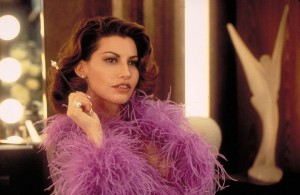 “Attention Wal-mart shoppers: Pink Flamingos is on sale this week for just $9.99 and if you buy it today, courtesy of our promotions department, at check-out, you’ll receive a complimentary pooper scooper and bib.”
“Attention Wal-mart shoppers: Pink Flamingos is on sale this week for just $9.99 and if you buy it today, courtesy of our promotions department, at check-out, you’ll receive a complimentary pooper scooper and bib.”
In the late winter of 1995, at a low-rent theater on the lower east side of Manhattan, I snuck into a midnight showing of one of the most notoriously terrible movies of recent memory. It wasn’t The Rocky Horror Picture Show. That was on the larger screen upstairs. No, this was a carefully test-marketed screening, complete with ringers in the audience pretending to be fans, of a movie that had opened four months before and been a terrible embarrassment for the studio.
Like any screening, the most important thing wasn’t so much the attendance, as it was the audience reaction. The surprise, and possibly why the whole thing was entirely unadvertised, was that the movie was MGM’s Showgirls. To my left was a guy who had brought in his own Versace bag, and at appropriate moments, especially when our heroine, Nomi Malone, would mispronounce it, he would scream out “Versayce, Versayce!” The entire movie had these built in distractions from the “audience” as well as moments where fully costumed men in drag danced in front of the screen. It was gloriously silly and never afraid to tweak the terrible script in possibly offensive ways for a laugh.
As the weeks went on, they continued screening it at midnight, but with no production value or “fans,” and it was therefore less fun. I’m not sure what they were expecting; Showgirls had only just hit video, and there was no time to build any sort of cult following, as it was still recovering from its critical and audience shellacking. After two months, it was gone. The last screening had a single person in attendance. I observed him for a few minutes and he wasn’t watching it for camp purposes, it was clear he hadn’t seen it before, and probably thought it was a second-run-theater type showing.
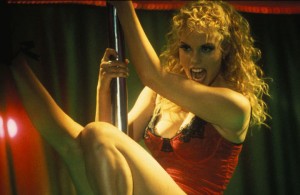 Cut to nine years later, and MGM is premiering the film in an all new way, this time in Chelsea (a very gay sub-section of Manhattan). The lines were long and you had to have a special invitation to gain entrance. Upon entry we were handed a bag of goodies, which I thought might have been just lobby cards or posters. It turned out it was a gaggle of various props which included among other things a roll of fake money, a noise clacker, a plastic rose, some gold lame fabric, and the most unfortunate inclusion, a page of instructions. MGM, in their attempt to cash in on the growing following the movie has attained for its wonderful ridiculousness (the screening was just in advance of a Showgirls box set DVD release which came with playing cards, shot glasses, drinking games, etc.), were telling us when during the film we were supposed to use what they had given us, and what lines we were to scream out during certain portions of the film. Unfortunately, none of the highly amusing and ribald jokes that were in the first midnight screening had made it into this highly politically correct event, which is rather odd considering the content of the film. This deliberate manufacturing of a cult film bothered me quite a bit. Cult films are decided by the audience, and often because the studio mishandled the project or didn’t realize how bad it was. The studio telling you the specific campy way you are to appreciate/mock their film is more than a little disingenuous.
Cut to nine years later, and MGM is premiering the film in an all new way, this time in Chelsea (a very gay sub-section of Manhattan). The lines were long and you had to have a special invitation to gain entrance. Upon entry we were handed a bag of goodies, which I thought might have been just lobby cards or posters. It turned out it was a gaggle of various props which included among other things a roll of fake money, a noise clacker, a plastic rose, some gold lame fabric, and the most unfortunate inclusion, a page of instructions. MGM, in their attempt to cash in on the growing following the movie has attained for its wonderful ridiculousness (the screening was just in advance of a Showgirls box set DVD release which came with playing cards, shot glasses, drinking games, etc.), were telling us when during the film we were supposed to use what they had given us, and what lines we were to scream out during certain portions of the film. Unfortunately, none of the highly amusing and ribald jokes that were in the first midnight screening had made it into this highly politically correct event, which is rather odd considering the content of the film. This deliberate manufacturing of a cult film bothered me quite a bit. Cult films are decided by the audience, and often because the studio mishandled the project or didn’t realize how bad it was. The studio telling you the specific campy way you are to appreciate/mock their film is more than a little disingenuous.
While there have been some deliberately campy films made recently (The Lost Skeleton of Cadavra, Reefer Madness: The Movie Musical), it is not a common phenomenon. But within the past few weeks, Lions Gate released the first example I can remember of a director re-doing his own unintentionally awful movie, into something more deliberately comedic. The disc is House of the Dead: Director’s Cut: Funny Version and the filmmaker is Uwe Boll, long the whipping boy for internet critics. Boll, who famously boxed a few of his loudest non-supporters, has made a living recently, adapting video games to the screen. House of the Dead was only the first; there was Alone in the Dark, Bloodrayne, In the Name of the King: A Dungeon Siege Movie, and another film that was just released to DVD, Postal.
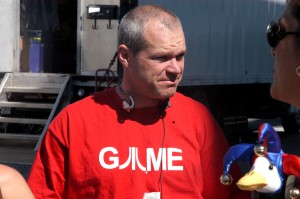 Boll is famous for somehow signing up major name actors for his productions, despite the scripts being inarguably terrible, and his directing and editing choices always make it look like they were unaware the camera was even rolling, and thought it was a rehearsal. Whether it was to pay for expensive divorces (Ben Kingsley in Bloodrayne) or hairpieces (Burt Reynolds in In the Name of the King), what is continuously baffling aren’t just the casting choices, but the associative value. Other than Reynolds, In Name of the King boasts Jason Statham, Ray Liotta, Leelee Sobieski, Matthew Lillard, Ron Perlman, and on and on. While that might explain the $60 million budget, what isn’t clear is why the actors would be willing to make fools of themselves, especially as each of Boll’s films get terrible press and lose ungodly amounts of money. The finances are certainly not on the screen. Boll has a habit of making $20 million look like $20 thousand. Everything has a rushed and indifferent feel to it, resembling a mid-level direct-to-video title.
Boll is famous for somehow signing up major name actors for his productions, despite the scripts being inarguably terrible, and his directing and editing choices always make it look like they were unaware the camera was even rolling, and thought it was a rehearsal. Whether it was to pay for expensive divorces (Ben Kingsley in Bloodrayne) or hairpieces (Burt Reynolds in In the Name of the King), what is continuously baffling aren’t just the casting choices, but the associative value. Other than Reynolds, In Name of the King boasts Jason Statham, Ray Liotta, Leelee Sobieski, Matthew Lillard, Ron Perlman, and on and on. While that might explain the $60 million budget, what isn’t clear is why the actors would be willing to make fools of themselves, especially as each of Boll’s films get terrible press and lose ungodly amounts of money. The finances are certainly not on the screen. Boll has a habit of making $20 million look like $20 thousand. Everything has a rushed and indifferent feel to it, resembling a mid-level direct-to-video title.
The negativity eventually caught up to Boll, after Alone in the Dark, his films were always promised 2,000 screens but would end up with no advertising and 800, culminating in last spring’s release of Postal, which was supposed to be on 1500 screens and ended up on 5. In a lengthy phone interview I conducted with Dr. Boll recently, he did say that once he found out about the distribution issues, a few weeks before the opening, he and his production company Boll KG, pulled their ads and TV spots entirely in support of the $15 million film. Much like a lot of what Dr. Boll said during that hour, I had a hard time believing it, there were news stories all over the place just days before the opening where Boll claimed that he would beat Spielberg at the box office (the 4th Indiana Jones film was released the same day as Postal). When talking to him, he comes off a lot like his print interviews and DVD commentaries, a strange combination of low self-esteem, neediness, and flat out antagonism. It seemed like an act to me, despite his ineptitude as a director, he is clearly an excellent producer, with project after project lined up for years to come. And that ethos is key to his productivity, before the bad press and audience reaction spreads; he’s already three films ahead of them. He did tell me that his anger about the way he is treated is legitimate, it was one of the reasons for the grim serial killer film, Seed, which was just released a week ago to DVD. He said that he wanted to make the audience feel bad, and grisly, unpleasant violence was the best way to get that message across.
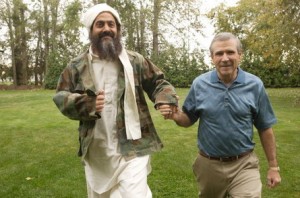 All of that is immaterial though, since the content of the three releases is the most important, not the way Dr. Boll builds up hype with his enthusiasm. Postal, a scattered and random satire about trailer parks and terrorists, with constant attempts to offend and outrage the audience (many, many 9/11 jokes), was another way to release his anger, and with its total lack of focus, it often resembles an overpriced Troma film (Terror Firmer¸ The Toxic Avenger). This was arguably Boll’s first attempt at English language comedy and it comes off exactly as awkwardly as it sounds. The jokes are broad and the film is trying really hard to make you laugh, but it appears the movie was made for eight-year-olds who don’t watch the news, but hear it third hand from their friends. Continuing his green-brown aesthetic, everything goes wrong right from the start, from the idiotic choice of handheld camerawork oft-resulting in the joke being off-screen, moldy humor about lines at government offices and how many different types of coffee you can get at a 7-11, to the editing and score choices which are right out of a sitcom. Sure, the idea of George W. Bush and Osama Bin Laden being friends could be funny, but the idea isn’t enough, and Boll didn’t bother with anything further. Boll’s language barrier (he is German and speaks English with a heavy accent) gets in the way of his understanding how to be funny in English, so Postal ends up being like a phonetic idea of comedy.
All of that is immaterial though, since the content of the three releases is the most important, not the way Dr. Boll builds up hype with his enthusiasm. Postal, a scattered and random satire about trailer parks and terrorists, with constant attempts to offend and outrage the audience (many, many 9/11 jokes), was another way to release his anger, and with its total lack of focus, it often resembles an overpriced Troma film (Terror Firmer¸ The Toxic Avenger). This was arguably Boll’s first attempt at English language comedy and it comes off exactly as awkwardly as it sounds. The jokes are broad and the film is trying really hard to make you laugh, but it appears the movie was made for eight-year-olds who don’t watch the news, but hear it third hand from their friends. Continuing his green-brown aesthetic, everything goes wrong right from the start, from the idiotic choice of handheld camerawork oft-resulting in the joke being off-screen, moldy humor about lines at government offices and how many different types of coffee you can get at a 7-11, to the editing and score choices which are right out of a sitcom. Sure, the idea of George W. Bush and Osama Bin Laden being friends could be funny, but the idea isn’t enough, and Boll didn’t bother with anything further. Boll’s language barrier (he is German and speaks English with a heavy accent) gets in the way of his understanding how to be funny in English, so Postal ends up being like a phonetic idea of comedy.
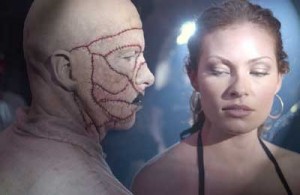
The only universal language appears to be in fart jokes, which are aplenty in Postal and find their way ad nauseum edited into the “Funny Version” of House of the Dead. The original film had the opportunity to be an amusingly trashy B movie about zombies on an island and the idiot rich kids who are there to get naked and be killed, but Boll’s ingenuity totally took over, inserting actual video game footage into the movie and including one of the most wonderfully idiotic sequences in the history of filmdom. This 12 minute scene is intended to show our heroes shooting at zombie after zombie, and there are a number of “Matrix” bullet time shots interspersed, and in theory it is ambitious, but in practice it is hilariously moronic and repetitive. The icing on the cake is the use of a rap/metal song on the soundtrack. It isn’t the terrible song itself that makes it work, it is the fact that the scene goes on so long that the song ends, and then literally starts up again and plays in its entirety (in the interview, Dr. Boll told me that the reason they played the song again was because they had run out of money and couldn’t afford any more music, so it seemed logical to play it over). The “funny version” misses the entire point, we don’t even get much of the scene that makes the movie so memorable, Boll just edits a bunch of outtakes of the actors cracking jokes and flubbing lines into the film, which I guess is his idea of being funny. Added to that is a pop-up track that mocks the movie in the least amusing way possible, giving you the perfect example of what happens when wonderfully untalented people try to pretend that they are in on the joke. Even Boll’s director’s commentary, normally a source of great arrogance and pleasure, is a total waste, as he takes no less than 7 phone calls during the 90 minute movie, often speaking in German to friends for a few minutes at a time, as if he couldn’t be bothered to even discuss his process.
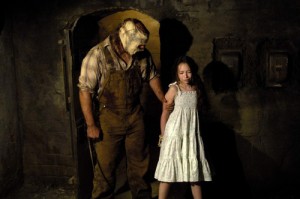 It is therefore a relief that Seed (not based on a video game) is a complete and total return to form. While arguments could be made that his funniest film is Heart of America, his foray into Columbine, Seed is just a cornucopia of stupid choices and misguided ideas. Opening with newspaper clips showing the results of Max Seed’s rampage after the state’s failed attempt to electrocute him, logically the movie would move on from there to show the aftermath. But Boll strangely chooses to give us nearly 50 minutes of everything described in the clippings, meaning there is not a whiff of suspense, or surprise in any individual scene. This is a welcome respite because it gives you time to waft in the details. The stiff acting, everything being underlit, and the attempts at 1970’s period details, all genius, especially the mustache and hair combos (and oh, the wigs!) that appear to be directly inspired by the Beastie Boys video for Sabotage. Unfortunately the highlight of the movie is relegated to the deleted scenes, where we watch our masked and anonymous serial killer put on a record and start doing a Jack LaLane exercise routine. I’m sure it was supposed to be chilling, seeing this violent animal stretch to innocent and goofy music, but it comes off as asthma-inducing funny. And it also is the most useful for determining whether or not one can intentionally create a cult or it has to be created organically. I’ll see you at the 10th anniversary of Seed with my clacker in hand.
It is therefore a relief that Seed (not based on a video game) is a complete and total return to form. While arguments could be made that his funniest film is Heart of America, his foray into Columbine, Seed is just a cornucopia of stupid choices and misguided ideas. Opening with newspaper clips showing the results of Max Seed’s rampage after the state’s failed attempt to electrocute him, logically the movie would move on from there to show the aftermath. But Boll strangely chooses to give us nearly 50 minutes of everything described in the clippings, meaning there is not a whiff of suspense, or surprise in any individual scene. This is a welcome respite because it gives you time to waft in the details. The stiff acting, everything being underlit, and the attempts at 1970’s period details, all genius, especially the mustache and hair combos (and oh, the wigs!) that appear to be directly inspired by the Beastie Boys video for Sabotage. Unfortunately the highlight of the movie is relegated to the deleted scenes, where we watch our masked and anonymous serial killer put on a record and start doing a Jack LaLane exercise routine. I’m sure it was supposed to be chilling, seeing this violent animal stretch to innocent and goofy music, but it comes off as asthma-inducing funny. And it also is the most useful for determining whether or not one can intentionally create a cult or it has to be created organically. I’ll see you at the 10th anniversary of Seed with my clacker in hand.



